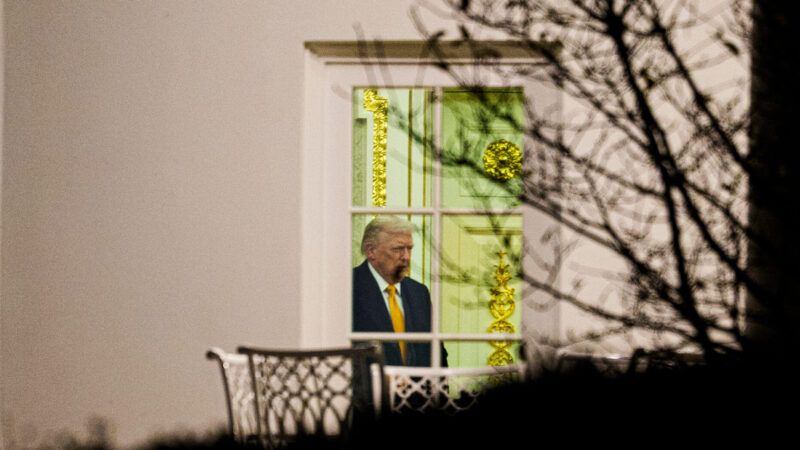Trump Seems Very Confused About 'Affordability'
The president says the affordability crisis is over, but he's also promising huge government checks. And he doesn't know how much gas costs.

While speaking to reporters in the Oval Office on Friday, President Donald Trump claimed that "every price is down," including those paid at the pump. Gas is now "almost $2," he added.
Gas is not $2 a gallon. The national average is a little over $3 a gallon, about the same as it was a year ago, according to AAA. Even if you're giving Trump wide leeway for that "almost," this is what would have been called a gaffe in more normal political times. Remember when President George H.W. Bush didn't know the price of a gallon of milk?
When you zoom out to Trump's larger point, things get even more confused. Despite Trump's claim, prices as a whole continue to rise at politically inconvenient rates. Annualized inflation was 3 percent in September, the most recent month for which data is available. Prices for food and housing are rising faster than overall inflation. Most Americans say they are spending more on groceries now than a year ago.
Even so, Trump kept digging in on this point. "'Affordability,' they call it, was a con job by the Democrats," Trump said in the Oval Office on Friday. He reiterated that argument on Truth Social. "My cost are lower than the Democrats on everything, especially oil and gas!" he thundered. "So the Democrats 'affordability' issue is DEAD! STOP LYING!!!"
If the affordability issue is "DEAD," then one might wonder about some of the other policies Trump announced over the weekend.
On Friday, the president ordered the Department of Justice to investigate the meat-packing industry for allegedly colluding to fix prices—echoing the Biden administration's ultimately futile attempt to blame food producers and "shrinkflation" for rising prices at the grocery store.
Then Trump announced on Sunday that he'd like to deliver $2,000 dividend checks to many American households.
Those checks would ostensibly be paid from tariff revenue, but the math for that doesn't work. And weren't the tariffs supposed to make America wealthier than ever? Then why the need for checks at all?
The weekend was a microcosm of the administration's confused economic policies. Is foreign investment in America a sign of strength or a crucial vulnerability that requires unprecedented emergency executive powers? Should the price of beef be higher or lower? If "every price is down," who needs a relief check? I don't expect principled policymaking from the Trump White House, but how about a little bit of consistency?
Trump can't believably stick to the message he wants to send—that everything is great—because he's made promises that can't possibly be achieved. On Inauguration Day he promised to "bring prices down," but inflation means prices always rise; it's just a matter of how quickly or slowly that happens. He said higher tariffs would resurrect manufacturing, but taxing inputs has (predictably) caused a nationwide slowdown across that sector. The ongoing crackdown on illegal (and legal) immigration is hurting the farming and construction industries.
This is the point where I'd normally point out that presidents don't really exert much influence over prices. There is no "lower gas prices" button in the Oval Office. Yet while it's true that market forces are the primary reason any price is what it is, this administration has taken a number of actions that directly and deliberately put upwards pressure on prices.
These aren't problems that can be solved with dividend checks, Justice Department investigations, or Truth Social posts. In political terms, Trump's claims are probably untenable in the long run. Few Americans will be fooled about low gas prices or falling food prices when they routinely go to the gas pump and the grocery store. The president has always been a bit out of touch, but he seems increasingly confused and inept too.
